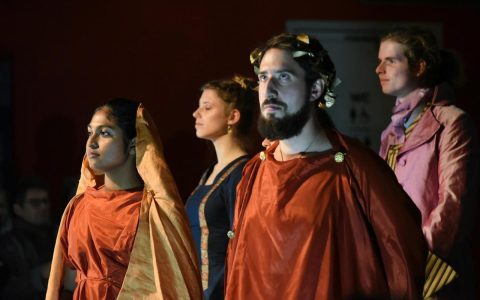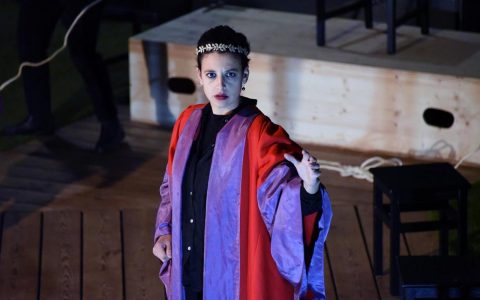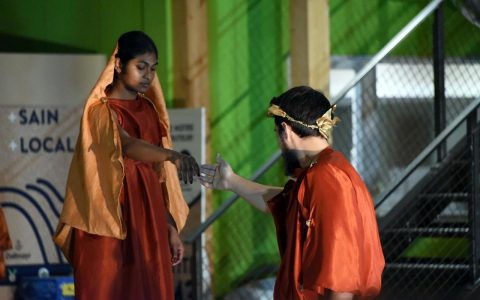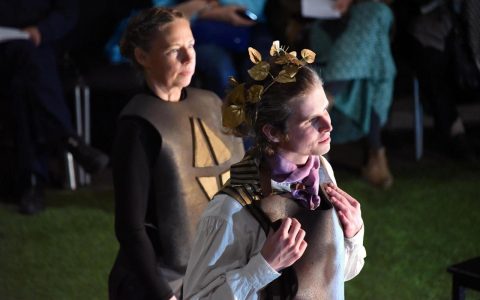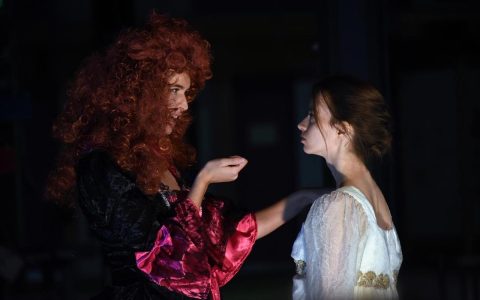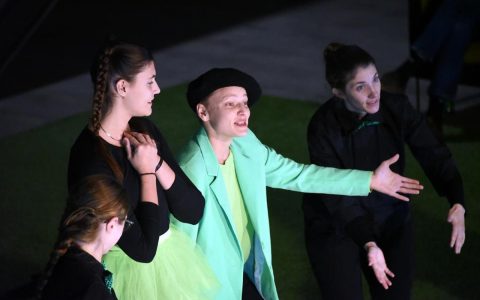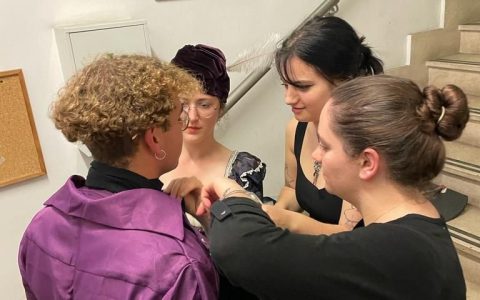Pericles, Prince of Tyre, may be the only protagonist who finds himself in an incestuous love-triangle, throws his wife over board and still ends up with a happy ending.
As an English student at the University of Fribourg, I had the opportunity to work with Elisabeth Dutton, Professor of English Philology, on her multilingual production of Shakespeare’s Pericles, Prince of Tyre (1609). This article aims to give the reader an insight into the production from three different angles: Prof. Dutton’s as the director, Jeremy Wright’s as an actor and my own as a member of the backstage crew.
The play was performed four times in Fribourg, Biel and Rome. Elisabeth Dutton and some of her students translated and edited the original English text into a multilingual version consisting of English, French, German and Italian, in order to adapt the performance to its Swiss context.
Plot Summary
Pericles, Prince of Tyre is a play co-written by William Shakespeare and George Wilkins, first published in 1609.
It begins with Pericles solving King Antiochus’s riddle in which the King reveals his incestuous relationship with his daughter. After confronting the King and his daughter, Pericles flees before Antiochus can have him murdered. On the run from the evil king, Pericles is cast ashore in Pentapolis and found by fishermen who tell him how knights are competing for the hand of Thaisa, daughter of their King Simonides. Pericles not only participates in this competition but also defeats his four competitors to marry Thaisa.
Back at sea to return to Tyre, Thaisa appears to have died in childbirth during a storm; Pericles reluctantly throws her body overboard to quiet the storm. The child, Marina, he leaves at Tarsus with his friends Cleon and Dionyza. Thaisa is, however, discovered in Ephesus where a doctor notices that she is not dead. She gains consciousness and, believing that her husband Pericles and her baby have drowned, decides to go live in the temple of the goddess Diana.
Fifteen years pass as Marina grows up with Philoten, daughter of Cleon and Dionyza. Dionyza wants Marina dead, as she exceeds Philoten in all qualities. But before the deed is done, pirates capture Marina and take her to Mytilene to be sold as a prostitute. However, because of her great virtue, she manages to escape the brothel.
Pericles, returning to Tarsus expecting his daughter, is told that she has died. He falls into a deep depression. Then, when Pericles’s ship makes port in Mytilene, Marina is brought in to help him get out of his depression. While talking to her, Pericles finally recognises her and is overcome by happiness. The same night, a vision of Diana appears, telling him to go to Ephesus; he obeys and there he is reunited with his wife Thaisa. She meets her daughter Marina and finally, they all return to Tyre.
Interview with Prof. Elisabeth Dutton (director)
What is your personal connection to theatre?
I have always been into theatre, and I even wanted to become a ballet dancer or an actress when I was younger. During my 20s I received training as a director and started directing. My first big medieval show was in Oxford where a student asked me to stage Fulgens and Lucres by Henry Medwall for their MA-thesis. From there I got more and more involved and tried to integrate it with my teaching: I also became interested in the academic field of “performance as research.”
Why did you choose Pericles, Prince of Tyre?
Pericles is a Shakespeare play not everyone knows which gives me a lot of creative freedom. In addition, it is not considered his best play on paper, and the text is very corrupt, but it really works on stage. It is also a play that has the potential to be linguistically interesting.
Where does the idea for a multilingual adaptation come from?
Yes, the idea for a multilingual adaptation goes back to 2014 when we staged Love’s Labour’s Lost at the University’s 125th anniversary. It was adapted to Fribourg, a bilingual city and a university with many different languages. We were inspired by Isango Ensemble, a South African theatre company who does adaptations in different languages. Pericles is a continuation of this project.
What do you enjoy the most about directing a play such as Pericles?
I like it when I am picturing something in my head and then I see it come together on stage. However, I also like the flip side, when something works but in a totally different way than I had expected. It’s the combination of control and spontaneity that I really enjoy. Also, the different groups of people that come together. We build a community and lots of actors or crew members keep in touch beyond university .On a more educational level, I like seeing how actors gain confidence with Shakespeare texts andare more informed afterwards.
Interview with Jeremy Wright (Pericles)
How did you come to this role?
I don’t have a lot of experience as an actor, I only did one play before taking on the role. When I heard about the project, I was very impressed and when I had the opportunity to step in because the first actor dropped out, I didn’t hesitate.
What’s the most challenging part for you as Pericles?
Definitely the four languages. It can be quite difficult to remember lines in a language one is not fluent in. It’s also a challenge to physically perform the story in a way that the audience understands the plot without needing to understand all four languages.
And what do you enjoy the most about being part of this play?
I enjoy how Elisabeth Dutton encourages us to explore language use beyond the page. She cares a lot about the cast and crew and is very passionate about directing and that motivates me to challenge myself as an actor. I also like how much we can learn on an educational level, about literature, theatre and much more.
And then there is us in the background
The third important part of a play involves everything that happens in the background: administration, reservations, props, costumes and so on. I had the opportunity to be part of the backstage crew with Céline Sidler, a former student of Elisabeth Dutton, who was part of several productions. With absolutely no experience I decided during a lecture of Prof. Dutton to help backstage and shortly after I was helping Aurélie Blanc with stage notes and became part of the costume & props team.
Our job was to find distinctive costumes for the different locations in the play, namely Tyre, Tarsus, Ephesus, Antioch, Pentapolis and Mytilene, and associate them with a time period and a colour. While Pericles and his court wore purple costumes from the Byronic era, Cleon and his evil wife Dionyza were dressed in hideous lime green clothes inspired by the 70s. The actors from the brothel in Mytilene portrayed a bit of a different version of pre-revolution France with their bright pink wigs and shirts and both Ephesus, in red, and Antioch, orange, were inspired by the ancient world, Ephesus with Ancient Roman costumes and Antioch with Ancient Greek ones. The court of Pentapolis, including Thaisa, was dressed in blue medieval costumes.
What I enjoyed the most is seeing how ideas turn into actual costumes and props. Even though it was sometimes a challenge, we were always able to find a solution. And, when we were not worrying about actors wearing socks with their Roman costume, pants being worn incorrectly or props being broken, we were having a great time backstage.
Text: Maria Papantuono
Bilder: Tanja Matic Photography
Author’s note
This article was written in English to maintain the authenticity of the interviews that were completely held in English. In addition, Pericles is a play written by English playwright William Shakespeare and with an article in English, I could use the names of the characters and locations in their original language. I see this experience as an addition to my English studies not only on an educational level, namely learning more about Shakespeare and theater, but also for my personal development as a writer. Considering all these points and the fact that we (Prof. Dutton, cast & crew) only communicated in English, it felt more natural to write this article in English.

